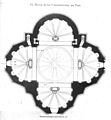Santa Maria della Consolazione, Todi

Santa Maria della Consolazione is a Renaissance-style pilgrimage church in Todi, Italy. The centralized, symmetric plan, surmounted by a tall dome, distinguishes this Renaissance church, from the more common elongated basilica or Latin-cross designs.
The original project is attributed to Donato Bramante, despite the absence of documentation. ,[1] supposedly aided by Baldassarre Peruzzi,[citation needed] began construction in 1508 on the flank of the city hill, just outside the walls. The design is often erroneously attributed to Bramante.[2] It has a Greek cross plan: three apses are polygonal and the one on the north side is semicircular. Other architects who helped bring the work to completion were Antonio da Sangallo the Younger, Galeazzo Alessi, Michele Sanmicheli, Vignola and . The church was completed only by 1607. The apse is surmounted by a square terrace with four eagles at the corners, from which the dome rises.
Legend holds that a worker, who was blind in one eye, had the sight of that eye restored when he wiped it with a cloth that had cleaned an icon of the Madonna. The church was built at the site where the icon had been housed, and now contains the icon at the altar. Twelve niches in the first three apses house giant statues of the apostles. Also noteworthy is the wooden statue of Pope Martin I, a native of the Todi area.[3]
See also[]
Gallery[]

Base plan of church
Interior plan

Interior

Exterior
Wide shot
Surrounding view
Sources[]
- ^ "San Maria della Consolazione by Cola da Caprarola at GreatBuildings". GreatBuildings. Retrieved 2020-08-23.
- ^ The Academy and Literature, Volume 30, 1866, William Mercer, Communication, page 366. 2007-03-01. Retrieved 2013-11-28.
- ^ Text in part derived from Todi entry
Coordinates: 42°46′40″N 12°24′07″E / 42.77778°N 12.40194°E
- Churches in Todi
- Renaissance architecture in Umbria
- 16th-century Roman Catholic church buildings in Italy
- Roman Catholic churches completed in 1607
- Centralized-plan churches in Italy
- 1607 establishments in Italy
- Donato Bramante church buildings







